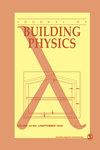Sensitivity analysis of the hygrothermal behaviour of homogeneous masonry constructions: Interior insulation, rainwater infiltration and hydrophobic treatment
IF 1.4
4区 工程技术
Q3 CONSTRUCTION & BUILDING TECHNOLOGY
引用次数: 11
Abstract
Historical masonry constructions are difficult to mimic in hygrothermal models. The material properties of the walls are often highly uncertain due to the natural origin of the aggregates and the various, manual production processes used through time. Therefore, sensitivity analyses based on probabilistic simulations are powerful tools to indicate the risks on damage in masonry constructions. Damage criteria for relevant pathologies such as frost damage, potential decay of wooden beam heads and mould growth at the interior surface are used. The assessment methods (Scatter plots, Classification trees and Sobol indices) are based on 1D Heat, Air and Moisture simulations, including realistic variations on climate parameters and wall properties. These methodologies are applied to probabilistic simulations in which a potential damage risk is expected in historic masonries. The application of interior insulation, the use of hydrophobic treatments, and the impact of potential water infiltrations through cracks are discussed. In most of these situations a high dependency of each of the damage criteria on the rain intensity, the trend of the moisture retention/liquid conductivity curve and the absorption coefficient is evident, but also additional insights are found. For example, the thermal impact of interior insulation is negligible compared to its reduction of the first phase drying potential towards the interior. For hydrophobic treatments, the risk for damage typically decreases, but in combination with a rain water infiltration rate above approximately 5% of the wind driven rain the risk on mould growth at the interior surface significantly increases.均质砌体结构湿热特性敏感性分析:内部保温、雨水渗透和疏水处理
历史上的砖石建筑很难用湿热模型来模拟。由于骨料的天然来源和长期使用的各种手工生产过程,墙壁的材料特性通常高度不确定。因此,基于概率模拟的敏感性分析是预测砌体结构损伤风险的有力工具。使用了相关病理的损伤标准,如霜冻损伤、木梁头的潜在腐烂和内表面的霉菌生长。评估方法(散点图、分类树和Sobol指数)基于一维热、空气和湿度模拟,包括气候参数和墙壁特性的实际变化。这些方法被应用于概率模拟中,其中对历史砌体的潜在损害风险进行了预测。讨论了内部保温的应用,疏水处理的使用,以及潜在的水通过裂缝渗透的影响。在大多数情况下,每个损伤标准都高度依赖于雨强度,水分保持/液体电导率曲线的趋势和吸收系数,但也发现了额外的见解。例如,内部绝缘的热影响是可以忽略不计的,相比之下,它减少了对内部的第一阶段干燥潜力。对于疏水处理,损坏的风险通常会降低,但在雨水入渗率超过约5%的情况下,室内表面霉菌生长的风险会显著增加。
本文章由计算机程序翻译,如有差异,请以英文原文为准。
求助全文
约1分钟内获得全文
求助全文
来源期刊

Journal of Building Physics
工程技术-结构与建筑技术
CiteScore
5.10
自引率
15.00%
发文量
10
审稿时长
5.3 months
期刊介绍:
Journal of Building Physics (J. Bldg. Phys) is an international, peer-reviewed journal that publishes a high quality research and state of the art “integrated” papers to promote scientifically thorough advancement of all the areas of non-structural performance of a building and particularly in heat, air, moisture transfer.
 求助内容:
求助内容: 应助结果提醒方式:
应助结果提醒方式:


